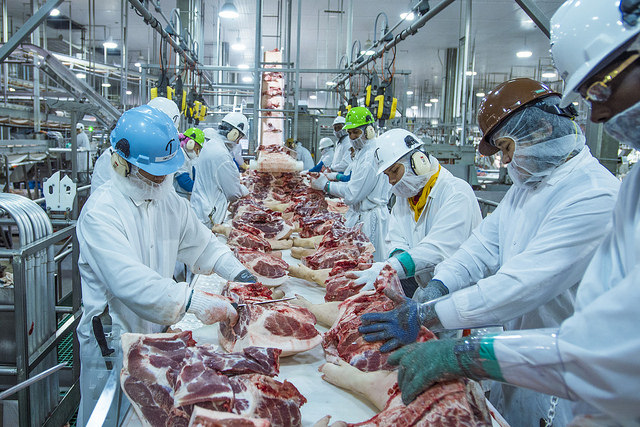



New US hog slaughter rules spark concern from pig industry
The US Department of Agriculture (USDA) has announced the final rules to modernise swine slaughter inspection and bring it into the 21st century but some industry members are concerned.The USDA earlier on Tuesday published a final version of rules that will eliminate limits on how fast companies, such as Tyson Foods and WH Group's Smithfield Foods, can slaughter pigs - a change long sought by meatpackers.
The final rule has new requirements for microbial testing that apply to all swine slaughterhouses to demonstrate that they are controlling for pathogens throughout the slaughter system. Additionally, FSIS is amending its meat inspection regulations to establish a new inspection system for market hog establishments called the New Swine Slaughter Inspection System (NSIS).

In the final rule, FSIS amends the regulations to require all swine slaughter establishments to develop written sanitary dressing plans and implement microbial sampling to monitor process control for enteric pathogens that can cause foodborne illness. The final rule also allows market hog establishments to choose if they will operate under NSIS or continue to operate under traditional inspection.
FSIS will continue to conduct 100 percent inspection of animals before slaughter and 100 percent carcass-by-carcass inspection, as mandated by Congress. FSIS inspectors will also retain the authority to stop or slow the line as necessary to ensure that food safety and inspection are achieved. Under the NSIS, FSIS offline inspectors will conduct more food safety and humane handling verification tasks to protect the food supply and animal welfare.
The companies can also now determine their own slaughter speeds based on their ability to prevent faecal contamination and minimise bacteria, according to the rules.
Packers can also have employees, rather than USDA workers, remove meat with certain defects from the slaughtering process. Government inspectors will continue to check all live animals before they are killed as well as meat products after slaughter.
The new rules have, however, divided opinions in the meat industry and some are concerned that the changes could lead to hygiene issues.
The changes could contribute to food contamination, said Wenonah Hauter, executive director of advocacy group Food & Water Watch.
"The implementation of the rule will result in the fox guarding the henhouse," Hauter said.
The warnings about the US Department of Agriculture's first update of inspection procedures at hog slaughterhouses in more than 50 years come after several high-profile recalls in the meat sector.
Tyson Foods, the biggest US meat producer, slowed chicken processing to protect food safety this year after it recalled millions of pounds of poultry products over concerns they contained extraneous materials like rubber and metal.
The North American Meat Institute, which represents the packers, said companies will continue to produce safe pork.
Slower processing leads to higher costs for companies and limits profits, but advocates say extra caution protects workers.
"Increasing pork plant line speeds is a reckless corporate giveaway that would put thousands of workers in harm's way as they are forced to meet impossible demands," said Marc Perrone, president of the United Food and Commercial Workers International Union, which represents slaughterhouse employees.
The USDA ran a pilot programme for the new rules that was announced in 1997. Participating slaughterhouses do not operate significantly faster than the current maximum speed of 1,106 pigs per hour, according to the agency.
The pilot programme showed the rules are unlikely to cause a higher prevalence of Salmonella on pork and may reduce the prevalence of Salmonella, the USDA said.
Under the new rules, the agency will require hog slaughterhouses to establish procedures to prevent meat from being contaminated by certain pathogens and faecal material.
"This regulatory change allows us to ensure food safety while eliminating outdated rules and allowing for companies to innovate," USDA Secretary Sonny Perdue said.








